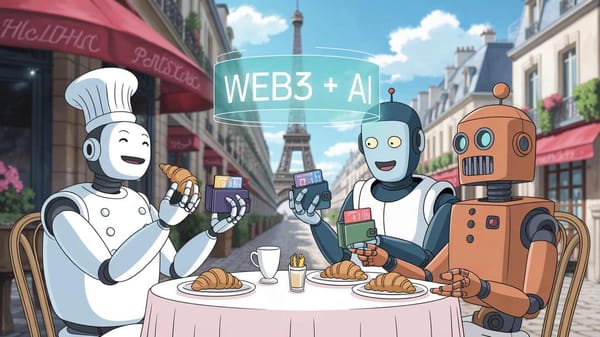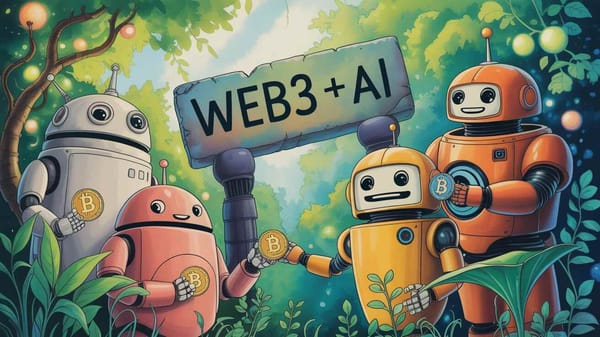The Web3 + AI Newsletter: Who, What, and Why?

It has been a year since OpenAI released ChatGPT - the event that unleashed overwhelming hype around artificial intelligence and especially the power of Large Language Models (LLMs). Accordingly, that AI boom stole the spotlight from the crypto space and shifted the big VC firms' attention to startups exploring the potential of machine learning and deep learning models and techniques.
However, over this past year, it became clear that decentralization, immutability, and open source - properties innate to blockchains, may be the key to successfully competing with the big names in the AI race, such as OpenAI, Google, and Meta. Moreover, given that AI is a centralizing technology by design, whereas blockchains promote control sharing, the two may very well complement each other.
This is the inaugural edition of Web3 + AI - a blog and weekly newsletter dedicated to the intersection of Web3 and AI. Welcome and thank you for being here!
Here is a list, though not exhaustive, of the questions the Web3 + AI blog will seek to answer:
- How open-source decentralized startups can compete with the big, centralized AI companies amid the often excruciating cost of running large AI models?
- How can blockchains be used as decentralized data storage and warehousing aimed at authenticating and tracking the provenance of data employed to train AI models? Who are the main players in this field?
- How can blockchains be used to distinguish between real and AI-generated content and to fight disinformation and fake news?
- How can blockchains be used to deliver distributed computation for training AI models? Who are the main players building computation marketplaces?
- Will the current GPU chip shortage fuel the growth of decentralized computation projects? And what will happen to the PoW-based blockchains with GPU mining if resources are redirected to AI model training? Which will be better monetized? Will this mark the end of all remaining PoW-based Layer-1 (L1) blockchains?
- We are currently witnessing a new era of L1 chains combining AI functionalities - will they be able to compete with Ethereum?
- What are the objectives and mission of ZKML projects combining zero-knowledge cryptography and machine learning? Who are the main players in this field?
- AI-powered DAOs - science-fiction or reality? Will AI deliver the long-for automation and autonomy to blockchains and decentralized autonomous organizations?
- Who is building AI autonomous agents on the blockchain? What will their use cases be beyond crypto trading?
- How legitimate are the fears of AI becoming capable of extinguishing the human race? Who is perpetuating them and why?
- Provoked by these same fears, the USA, and the EU are both now adopting their first-ever AI regulations. How will they guarantee that these new rules won't harm small-scale innovation and progress?
- What is ethical and safe AI? Who has the authority to define it and fight for it? And who cares more about protecting privacy, security, and transparency than the decentralized crypto community?
My goal with this blog is to help you get familiarized and stay up to date with all the developments and actors in the space. I will also strive to distinguish the proliferating myths and science fiction around AI from the reality of what the technology is really capable of accomplishing.
Every week, I will deliver a detailed and long-form analysis of the latest updates, both here and on my LinkedIn Newsletter. In addition, this space will be reserved for interviews, reviews, and op-eds. Make sure you subscribe either here or on LinkedIn to receive every new edition sent straight to your mailbox.
Many experts believe that AI may in fact become blockchains' killer app and gateway to mass adoption. Join me in discovering whether that will be true!
Disclaimer: None of this should or could be considered financial advice. You should not take my words for granted, rather, do your own research (DYOR) and share your thoughts to create a fruitful discussion.




